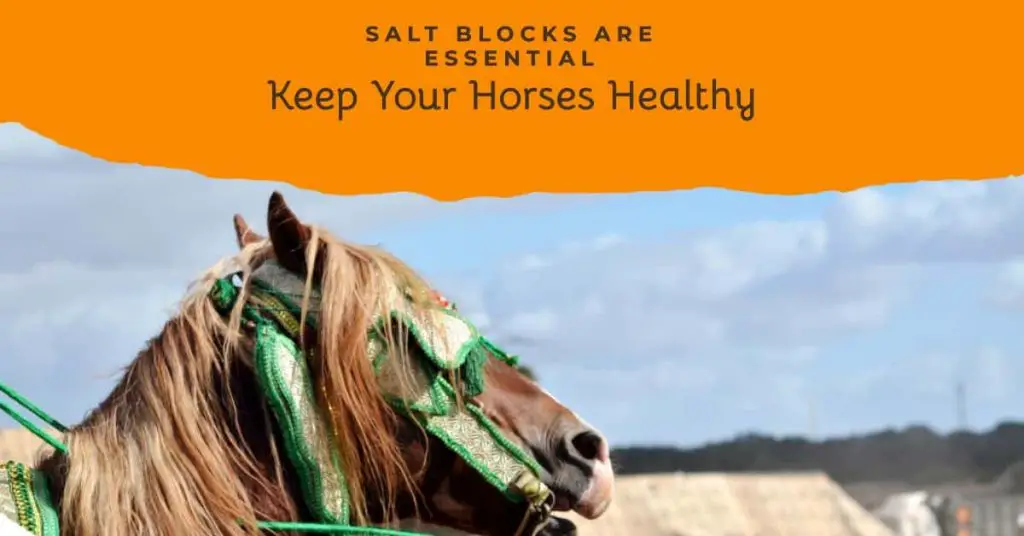Yes, horses need salt blocks. Salt is an essential mineral for the proper health and growth of a horse. Horses require at least 0.3 to 0.5 per cent of sodium chloride in their diet daily, which equates to approximately one ounce per day for the average 1,000-pound horse.
If a horse does not get enough sodium from its feed or pasture grasses, it will look for other sources, such as salt blocks or licks in most feed stores and tack shops.
Salt blocks provide an easy way for horses to supplement their diets with additional sodium if needed and should be placed in areas accessible by all horses on the property so they can help themselves when necessary.
Horses need salt in their diet to help maintain electrolyte balance, support nerve and muscle function and regulate normal water movement in the body. Salt blocks are an effective way of providing horses with essential sodium and chloride ions. Not only do they provide these important minerals, but many horses enjoy licking a salt block as it can act as a natural calming agent.
When selecting a salt block for your horse, be sure to choose one specifically designed for equines so that you know you are getting all of the essential nutrients they need!
Do Horses Need Salt Blocks in Winter
Horses may need salt blocks in the winter months to replace lost electrolytes and maintain a balanced diet. Salt blocks provide an easy way for horses to access dietary salt while grazing.
Which can be limited during the colder season when grass is sparse or covered in snow. Regular access to salt will help ensure that your horse has enough minerals and nutrients during the winter months.

How Do I Know If My Horse Needs Salt?
It is important to know if your horse needs salt in order to keep them healthy and happy. Salt can help maintain electrolyte balance, aid digestion, and provide essential nutrients for horses. Signs of a horse needing more salt could be excessive sweating or poor performance during exercise.
A decrease in appetite and increased drinking water may also be signs that your horse needs additional salt. Your veterinarian may recommend adding extra salt to your diet if you notice any common symptoms associated with a lack of sodium intake.
If the amount of sodium provided by hay, grain, pasture grasses or supplements isn’t sufficient, then providing loose-form white table salt or trace mineralized salts should do the trick!
However, it’s best to consult with your vet first before making any changes since too much salt can cause health problems such as colic and dehydration.
Monitor how much they are consuming on a daily basis and make sure you’re providing enough but not too much – this will ensure that your horse has all the minerals it needs without risking overconsumption!
Selecting the Right Salt Block
When choosing a salt block for your horse, there are a few key factors to consider. Look for salt blocks made specifically for horses, as they contain the right balance of minerals horses need.
Avoid blocks with added flavours, sugars, or molasses. The size of the salt block matters, too – larger blocks tend to last longer but can be difficult for some horses to lick.
A good rule of thumb is to provide one standard 50 lb salt block for every 2-3 horses. Place the salt block in a clean, dry area protected from the elements where horses have easy, free-choice access.
Monitoring Your Horse’s Salt Intake
It’s important to monitor how much salt your horse consumes from a salt block. Consuming too much salt at once can lead to diarrhoea or even colic. Signs your horse may be getting too much salt include increased thirst, irritated skin around the mouth, or loose manure.
If you notice these signs, consider removing the salt block for a few days and reintroducing it. You can also try a smaller salt block or place it somewhere less convenient to regulate intake. Providing loose salt instead of a block is another option. Track how quickly your horse goes through salt to ensure they aren’t overdoing it.
Alternatives to Salt Blocks
While salt blocks are convenient, there are other ways to provide supplemental salt if your horse won’t use a block. You can add loose white table salt or trace mineral salt to your horse’s feed ration per your vet’s recommended amount.
Also, sprinkle plain salt on wet hay or feed so it sticks. Salt-based supplements designed for horses are another option. Some horses may prefer Himalayan rock salt licks. Always provide plenty of fresh, clean water when offering extra salt to prevent dehydration. Checking with your vet first is advised when changing up your horse’s salt intake.
How Important is a Salt Block for Horses?
Salt blocks are an important part of a horse’s diet and overall health. Salt is essential for the horse’s electrolyte balance, which helps to regulate body temperature, muscle performance, and nerve transmission.
Without adequate salt in its diet, a horse can become dehydrated or suffer from colic or other digestive issues.
Additionally, salt is necessary for horses to absorb other trace minerals, such as calcium and magnesium, which are vital for healthy bones and teeth. Salt blocks provide horses with an easy way to access these minerals in addition to their daily feed ration since they contain both macro-minerals like sodium chloride and microminerals like phosphorus and zinc.
Furthermore, salt blocks also help keep horses hydrated by inducing them to drink more water – something that’s especially beneficial during hot summer months when dehydration becomes a greater risk factor.
As you can see, providing your horse with access to a salt block is not only convenient but highly beneficial for their overall health!
Do Horses Need Salt in the Winter?
Horses need salt in the winter to stay healthy and strong. Salt helps them absorb more of their food’s nutrients, essential for maintaining a balanced diet. In colder climates where temperatures drop below freezing, horses may require additional sources of electrolytes.
This can be achieved using salt blocks or adding a plain table or rock salt to feed mixes. The amount of salt needed can vary depending on the horse’s needs and activity levels; therefore, it is important to consult a veterinarian or nutritionist before changing your horse’s diet plan.
Additionally, always make sure that fresh water is also provided alongside any added salts so that horses don’t become dehydrated as they consume more sodium than usual during this time period.
Taking these simple measures will ensure that your horse remains healthy throughout the winter months and beyond!
Should All Horses Have Access to a Salt Block Year Round?
Yes, all horses should have access to a salt block year-round. Salt is an essential mineral for horses and plays an important role in their health and wellbeing. Salt helps regulate metabolism, aids in digestion, and can help reduce stress levels.
It also supports healthy muscle function and nerve tissue health. Additionally, when available, the horse will consume just enough salt to meet its daily needs for electrolytes, which are crucial for proper hydration. Therefore, providing them access to a salt block ensures they have sufficient amounts of this vital nutrient throughout the year.
Furthermore, free-choice access to salt has been found to be beneficial during periods of intense exercise or heat stress as it helps replace lost minerals due to sweating or dehydration more quickly than if the horse was not given any additional sources of sodium chloride supplementation.
Finally, while too much salt can cause problems such as colic or laminitis if overconsumed by your horse, these risks are minimal compared to the potential benefits of having ample access to a reliable source of electrolytes year-round!
Horses Need Salt 🧂 // Versatile Horsemanship
Conclusion
In conclusion, salt blocks can be beneficial for horses in certain circumstances. However, most horse owners should be aware that their horses will usually get enough salt from regular feed and water sources. Additionally, it is important to remember that too much salt can cause health problems for your horse, so care should always be taken when adding any supplemental sources of salt.
Janet G Kulick is an experienced horse rider, trainer, and owner of the informative horse blog, Horseray.com. Her engaging writing style and wealth of knowledge on horse care, riding, and training make her a trusted source for horse enthusiasts worldwide.






